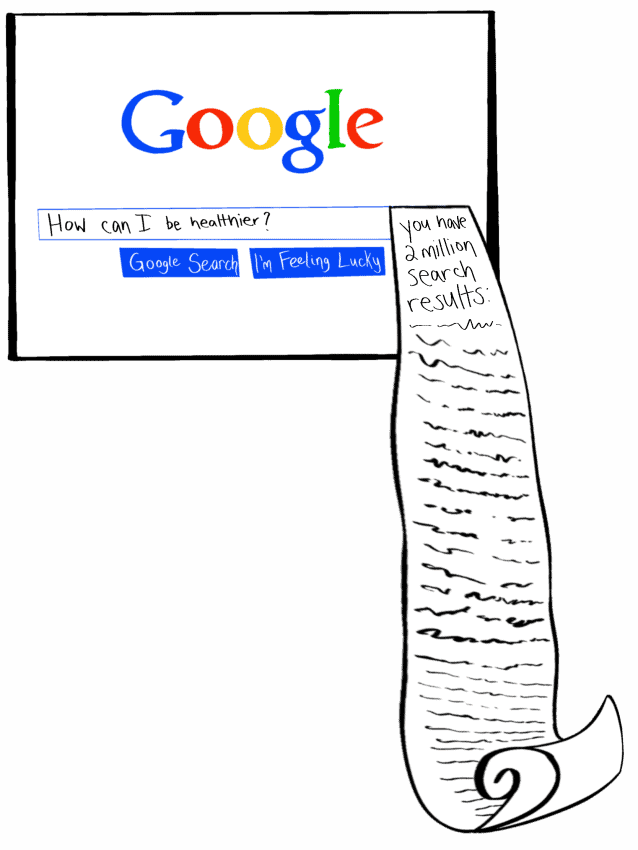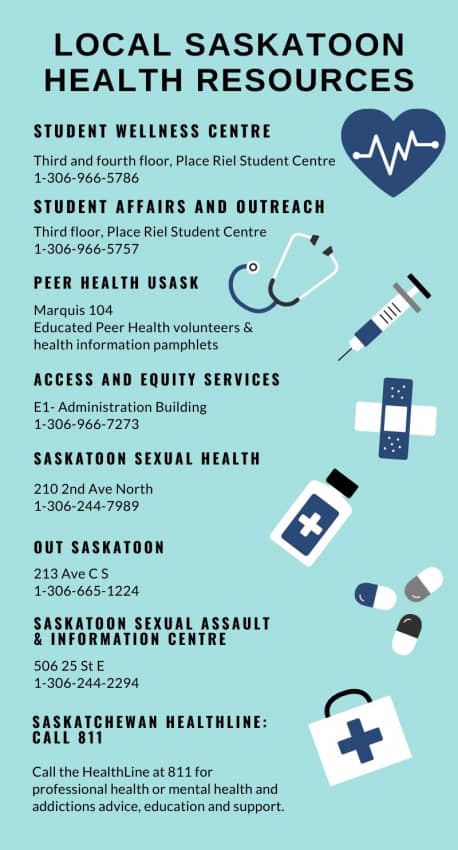
With the rise of the internet, it is incredibly easy for those with computer access to go online and search for any information that might be relevant to them. This access is both a blessing and a curse.
We live in a time where people feel criticized for not knowing what steps to take to make lifestyle changes to improve their lives. This criticism often boils down to, “it is not a lack of resources, it’s your lack of resourcefulness that stops you,” a phrase from Tony Robbins. But what if you were told that a lack of resourcefulness is not the problem?
The perils of Google searches
The very first thing many people do when they are concerned about their health is to go to “Dr. Google.” Searching online for solutions to health concerns can produce neverending results that are overwhelming.
Resources, strategies and advice for any given health concern often present sources that contradict each other and information that is not based on science. A lot of the information and product advertisements aren’t likely going to help you change anything but your bank account balance.
Most health information searches commonly show websites such as WebMD, which may appear more reputable than other sources, despite disclaimers stating they do not provide medical advice, diagnosis or treatment.
So if you are not getting medical advice, what are you reading? You are getting “health information” — which is not personalized to individual circumstances. However, if health websites call this “information” rather than “advice,” it protects them from any liability issues.
Let’s say that for the last two weeks you feel like you cannot catch your breath — like everytime you take a breath in, it gets lost somewhere on the way to your lungs. So you go online and do a quick search to see if there is anything you can do that might help.
You find some WebMD articles — perfect, there should be some solid advice there, right? They do work closely with doctors and health experts to keep content up to date and accurate to help you live a healthy life. But again, they don’t claim any liability over how their advice affects you.
Some of the search results tell you that you may be experiencing anything from allergies to heart failure to panic attacks to obesity — all of which have completely different courses of treatment. Should you practice meditation, start an exercise regime or immediately go to the emergency room?
One of the health articles you land on says you are probably experiencing some allergies — it fits pretty well so you go with the recommended treatment. Maybe you can make things better by changing air filters, staying indoors during peak pollen times and washing your bed linens once a week.
This change brings you some comfort for a week, you feel more relaxed, but then you find yourself feeling the same symptoms again. Maybe your breathing difficulty is part of a bigger, more complex issue.
The Band-Aid you put on your bullet wound came off and you are exactly where you began — sitting on Google trying to figure out why you don’t feel well again. Maybe it’s because the one symptom you identified is not the only one and you do not even realize it.
Health needs a holistic approach
To provide health advice based on one symptom, one internet search or one component of a person’s wellbeing may not even be addressing the underlying issue.
Health is a state of being with a multitude of interconnected factors that all influence one another. Rather than a single factor, illness or condition a person may be experiencing, a true picture of a person’s health focuses on the person as a whole.
The complexity of an individual’s health increases the elaborate nature of publishing medical information online. Regardless of how this information is labelled as advice or not, users are likely to see the information as advice, and use it to address any concerns.
Although health may be complex, using a search engine is not. It can take less than two minutes and you can search from the comfort of your home rather than waiting hours in a walk-in clinic to see a general practitioner.
You type in what you are looking for information on and you get thousands — if not millions — of results. However, when searching for information online, you cannot type enough words in the search box to get the whole picture.
Everything you read online in regards to your health is not necessarily applicable to you. Informational posts and programs for health or behaviour changes are not personalized, and in many cases, not effective for a lot of individuals.
Blogging doesn’t make you a health expert
With anyone from educated professionals to influencers and bloggers sharing information online — and your social media acquaintances spreading it — you are being overwhelmed with health information. And how do you know where this information is coming from or what it is based on?
Although these posts may be well-intentioned, the unfortunate reality is that there are dangers of following impersonalized advice. Twitter, Instagram, Pinterest and Facebook are common networks for health, fitness and diet information, but these posts often lack information to help you determine if it is safe or appropriate for your personal use.
Some influencers have millions of followers on social media, allowing them to share information with people across the world. Rather than legitimate credentials, these influencers carry followers as their badge of legitimacy, which can lead to a false sense of trust.
The ability to share health‑ related information across large platforms has the potential to positively affect many people, but the information shared can easily be taken out of context, misrepresented, misinterpreted and omit pre-screening protocols that may indicate increased risks for some people.
Numerous posts of testimonials from clients, before and after photos, lists of health benefits and positive personal experiences encourage readers to follow the same behavioural changes in hopes of positive results. In spite of testimonials describing an individual’s positive experiences with any given lifestyle change, the effects are not necessarily the same for everyone.
Some social media platforms commonly used for sharing this type of information also run the risk of portraying a highlight reel rather than real life. It’s not like you are going to have influencers promoting a product or behaviour associated with negative reviews or subpar results.
Lifestyle changes are not meant to be polarizing. They are not meant to create change overnight and they are not meant to be overwhelming and exhausting. But if you do not have the right background to discern between evidence-based practices and trendy health fads, this is exactly what these changes can become — overwhelming and exhausting.
Just consult a health professional
While you do not need a medical degree to share accurate health information, it is more common for those without certifications to share inaccurate recommendations, and can be difficult for those without proper education to determine whether or not the information is accurate.
Credentials often give you an associated title but a title doesn’t give you credentials. Consider health and wellness coaches, counsellors and psychiatrists for example.
While health coaches and counsellors may have varying levels of health education, their titles are not protected, meaning anyone can claim that title without formal education. There are still counsellors and health coaches out there that are consulting with clients in optimal ways, but it means that there is a higher likelihood of running into some not-so-reputable self-proclaimed professionals.
Psychiatrists, however, are highly regulated. To be a practicing psychiatrist in Canada, you must have a medical degree, specialist certification in psychiatry and a license to practice in your province. This means that seeing a psychiatrist guarantees a high level of health education and training.
If you dig deeper into your breathing difficulties during a visit to your general practitioner and they recommend you see a mental health professional because they believe you have anxiety, who would you want to see? Would you want to see a health coach that may or may not have training, or a psychiatrist that you know has required training?
If it is the case that you are experiencing anxiety, you are not the only one on campus — and you wouldn’t be the only one not using professional consultation for anxiety management. According to the 2019 National College Health Assessment, 70 per cent of University of Saskatchewan students reported feeling overwhelming anxiety at any time within the last 12 months. Yet only 26 per cent were treated or diagnosed by a professional for anxiety.
What about the other 44 per cent reporting feelings of overwhelming anxiety without professional treatment? Are online resources and self-proclaimed professionals helping them cope, or leaving it to lay dormant?

With certifications and degrees not being a be-all, end-all of getting legitimate consultations and accurate information, these certifications do provide more regulation and specific science-based guidelines for clinicians to follow.
Without knowing which titles are protected and which people have proper and legitimate training rather than a weekend course, this can be difficult to navigate.
There is a great deal of science-based information available at our fingertips, if you know where to find it. This information can be used effectively as a guideline for helping to make lifestyle changes, but it cannot be your only source of information.
Consult your physician, certified personal trainers, registered dietitians — consult anyone with legitimate experience and knowledge on health and health behaviours. Without consulting with professionals, you are putting yourself at risk to do more harm than good.
With the extensive free resources available on campus and within Saskatoon, it’s guaranteed that you can find something better than generalized results.
When in doubt, throw Google out — or at least throw out the blog posts and untrained professionals and take a look through journal articles. Better yet, go speak to someone who is trained in healthcare who can help you understand what is going on.
—
Shawna Langer/ Graphics Editor
Graphic: Shawna Langer/ Graphics Editor
Leave a Reply